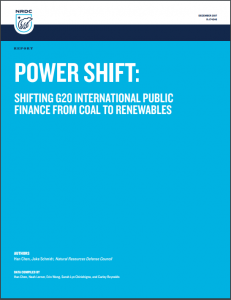Full Title: Power Shift: Shifting G20 International Public Finance From Coal To Renewables
Author(s): Han Chen & Jake Schmidt
Publisher(s): Natural Resources Defense Council
Publication Date: December 1, 2017
Full Text: Download Resource
Description (excerpt):
Renewable energy is taking the globe by storm, becoming competitive with and sometimes even cheaper than coal power. According to a 2016 report by the International Renewable Energy Agency, prices for solar PV modules and wind turbines have fallen roughly 80 percent and 30 to 40 percent respectively since 2009, thanks to technology improvements and economies of scale by the countries that have invested heavily and installed large amounts of solar and wind capacity, such as China, Germany and the U.S. Given the climate challenge the planet is facing, this shift is a crucial step in reducing global emissions and providing countries with access to clean energy. Many G20 countries are leading this transition. China invested $366 billion in renewable energy domestically from 2013 to 2016, 30 percent of the global total, followed by the United States (18 percent), Japan (12 percent), the UK (7 percent) and Germany (6 percent.)
In addition to G20 countries’ domestic actions to expand renewable energy, it is also important to evaluate how they are using their public funds abroad. This report examines the public financing provided by G20 countries to developing countries, and whether their international actions to support clean energy are in line with their domestic actions. The report finds that G20 countries’ financing for renewable energy projects abroad has indeed grown, but more effort is needed to shift investments away from coal to renewables.
Coal power plants represent the single largest source of global carbon emissions from combustion. These emissions jeopardize our chances of realizing the Paris Agreement’s goal of limiting global temperature rise to 2 degrees Celsius above preindustrial levels, and making best efforts to keep it below 1.5 degrees Celsius. Coal power plants also emit a range of harmful air pollutants (e.g., sulfur dioxide, nitrogen oxides, particulate matter, and mercury) that negatively impact the environment and public health. Nevertheless, G20 nations have invested billions—and counting—in coal power projects beyond their borders, and are just starting to ramp up financing for renewable energy to reach comparable levels.
